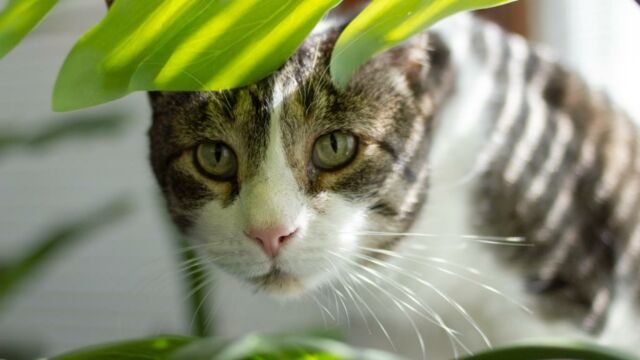Cats are keen explorers. They find the most incredible places to hide, they knock things over without apparent reason, they trash neatly ordered piles of clothes and paper, and they try to nibble on houseplants. The latter sounds like another one of cats' antics but it is actually really dangerous for felines.
Discover our latest podcast
Unfortunately, our favourite house greenery can be toxic for the kitties. Here are the ones to keep out of their reach.
Aloe Vera

The healing Aloe Vera plant can be found practically in every house. Known for its therapeutic properties for humans, it is actually toxic for your cat if ingested.
It contains poisonous saponins and anthraquinones.
Pothos (Epipremnum aureum)
Posted by myPlantTerra on Friday, September 30, 2022
Due to its low maintenance nature, pothos is an attractive houseplant for both amateur and experienced plant owners alike. Though pothos is completely safe to touch, insoluble calcium oxalates make it poisonous to cats.
Jade Plants (Crassula)
Repotted into 4 pots of different sizes
Posted by Candy Chin on Tuesday, September 27, 2022
Jade plants, also known as ‘money plants’ are a type of succulent that is easy to grow and thought to bring good luck and fortune to their owners. Unfortunately, jade plants are highly toxic to cats, dogs, and horses.
Snake Plant (Dracaena trifasciata)
Someone said to me recently, “buy a plant, name it after yourself, and take care of it.” I laughed. Then THAT DAY a...
Posted by Annie F. Downs on Friday, September 23, 2022
Snake plant is well-known as one of the best plants for low light conditions, and for improving air quality—making it an extremely common houseplant. While snake plants are non-toxic for humans, due to the saponins found in this greenery, it is toxic for both cats and dogs if ingested.
English Ivy (Hedera helix)
Posted by Oxy-Plants on Wednesday, October 26, 2022
English ivy has small, pointed leaves and makes for a delicate display. It is popular as a houseplant grown in hanging planters thanks to its gorgeous drapery. This same feature can make it appear like an attractive snack to curious felines, which can be extremely dangerous when ingested. The toxicity is attributed to triterpenoid saponins.
Sago Palm (Cycas revoluta)
Posted by Clays Mill Veterinary Clinic on Saturday, October 10, 2015
Sago palms add a touch of the tropics to your home and can do wonders for indoor air quality. Their unique structure makes them a great talking point and a lovely accent piece. However, these plants have an ancient defence mechanism: cycasin makes them highly toxic to furry kids. They should be avoided at all costs if you have cats at home.
Cutleaf Philodendron (Monstera Deliciosa)
**How much you know about Monstera?** 🌿 Get quick a **Monstera** one Esty here: https://tidd.ly/3m2R6De * Monstera...
Posted by Beatrix Smith on Friday, October 22, 2021
Monstera deliciosa is one of the most trendy tropical houseplants featured extensively on social media and in home decor, thanks to its stunning tropical foliage. Also referred to as ‘Swiss cheese plants’ or ‘Split-leaf philodendrons’, Monsteras contain insoluble calcium oxalates making them highly toxic to cats.
Peace Lily (Spathiphyllum)
My peace lily which I was given as a present 3 yrs ago has grown its first flower..I feel like a proud grandma..🤣🤣 Don't...
Posted by Alexa Armour on Sunday, October 23, 2022
Peace lilies are one of the most common flowering houseplants. Their dark leaves, white flowers, and low maintenance requirements make them a very popular choice. However, these beauties contain dangerous calcium oxalates.
What to do if your cat ingested a toxic plant?
If you suspect your cat has ingested poisonous plants, call your vet immediately.
Unless a pet health professional tells you to do so, don't try to induce vomiting as in some cases, it can be more dangerous for them to vomit whatever they consumedthan to leave the toxin in their stomach.
Sources used:
- The Spruce: '9 Popular Houseplants That Are Toxic to Cats'
- Hill’s Pet: 'The Most Common Poisonous Plants to Cats'















